SUMMARY
This is AI generated summarization, which may have errors. For context, always refer to the full article.

If you’re in the metro like I am, I’m sure you’ve savored the past few days of intermittent rain. For those who’ve been working from home and bearing the suffocating and draining heat, it is change. The rhythmic pitter-patter that invites you to slow down and take a short break from the intensity of Philippine politics reminds us that summer isn’t forever.
I’m Chay Hofileña, managing editor of Rappler, tasked with overseeing editorial content and operations covering both hard and soft news. I coordinate a lot with section editors and what we call our Central Desk (CD), the hub that connects the different spokes of the Rappler wheel. As a newsroom, we use different (some say too many) channels for communication, but central to us is Slack. This is where most issues, questions, doubts, and concerns, are raised, addressed, and settled – including those related to the political season.
There’s been a lot of anticipation lately about political tandems and coalitions, given the approaching May 2022 elections. Candidates are known to be just waiting for the end of what some call the “ghost month” of August, before they decide or announce major decisions and moves.
Key to making these decisions is data provided by surveys. Many smart political strategists and campaign managers depend on surveys to mount their plan of attack, determining specific areas where their candidates are weak, what kind of messaging clicks, and whether their bets have a winning chance. An election, after all, is about winning with eyes wide open. Typically, survey results are fodder for the media. But should they be? All the time?
In our own CD Slack channel in the early part of the year, we reminded ourselves about a decision we had made not to publish every survey result released by polling firms. We said we would steer clear of the tempting horse-race reporting on elections, which focuses on who’s leading or losing. Let me share with you why.
Agents of Power
When other media organizations do the exact opposite, fueling the public appetite for this kind of reporting that suppresses “boring” issues that should be brought to the attention of the public, the temptation to publish becomes strong. More so when readers think we just missed the story and were outscooped by the competition.
But we remain steadfast when reminded of what J. Herbert Altschull says in Agents of Power The Media and Public Policy: “It is not the media that shape public opinion. It is rather the holders of power who shape public opinion by using the media as their agents.” It becomes a dangerous game of perception, propaganda, and manipulation.
According to Altschull: “The critical use of polling in the electoral process lies not in mere data collection but in image making because the images generated on the basis of polling can be decisive.”
Polling results, according to one pollster he cites, “can influence election results by as many as four points.” With social media as an added factor today, who knows how much more influential these survey results could be – especially at the tailend of a campaign.
We’ve watched many political campaigns in the past and while admittedly, a symbiotic relationship exists between politicians and their spinmeisters on the one hand, and the media on the other, journalists like us have become tons wiser. We can spot trial balloons and ignore them. We can sniff attempts to create news events or attempts to create early and false trends, even fake political symbolism. We know that survey results are fleeting, dynamic, and can change rapidly. I just needed to review the results we tracked for the 2010 and 2016 presidential elections to be reminded of this.
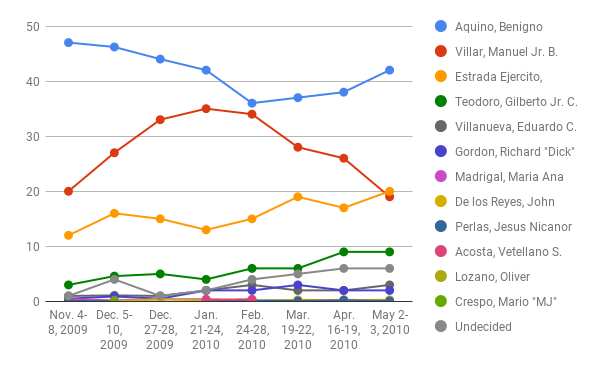
Back in November 2009, after certificates of candidacy were filed, Noynoy Aquino was clearly at the head of the pack, but in the Social Weather Stations’ survey results, Manny Villar gave him a deadly scare by February 2010, just three months before elections.
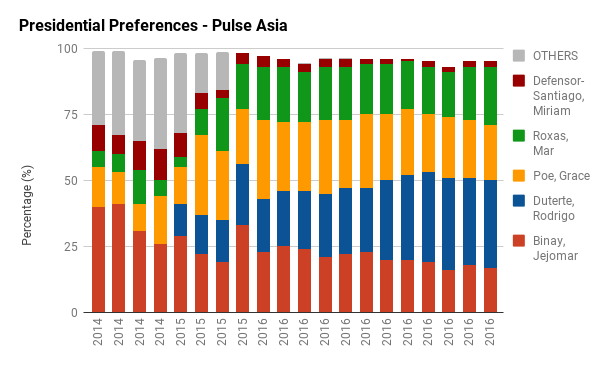
In the 2016 presidential contest, Jojo Binay and Grace Poe (red and yellow in the chart) were early leaders and Rodrigo Duterte (blue) was nowhere in sight until March 2015 – about 15 months before elections. He would eventually take over Binay and Poe by March 2016, just two months before elections. These past two presidential election survey results are proof that whoever is at the head of the pack early on will not necessarily always be number one or emerge the winner. No lead is permanent. No lead is insurmountable. Numbers are never cast in stone.
Our pledge
Last Saturday, July 17, the Election 2022 Pledge for Journalists and Media Organizations, signed by at least 300 Filipino journalists, was released to the public. Among other things, the signatories, which include Rappler, pledged to: “Contextualize reporting on surveys and the winnability of candidates. We will not report on surveys without verifying the source of the polling data, the track record of the companies conducting the polls, the methodologies used, and the questions asked.”
The key word is “context” when reporting on surveys to avoid falling into the trap of becoming “agents of power.” If ever we forget or falter, do call us out and remind us. The media will only be as resilient, alert, and independent as public support will push it to be.
Add a comment
How does this make you feel?
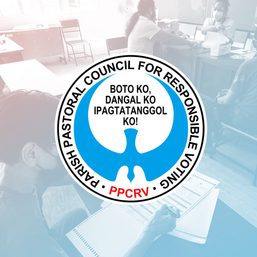



![[PODCAST] Beyond the Stories: Ang milyon-milyong kontrata ng F2 Logistics mula sa Comelec](https://www.rappler.com/tachyon/2021/11/newsbreak-beyond-the-stories-square-with-topic-comelec.jpg?resize=257%2C257&crop_strategy=attention)


![[New School] Tama na kayo](https://www.rappler.com/tachyon/2024/02/new-school-tama-na-kayo-feb-6-2024.jpg?resize=257%2C257&crop=290px%2C0px%2C720px%2C720px)
![[Only IN Hollywood] After a thousand cuts, and so it begins for Ramona Diaz and Maria Ressa](https://www.rappler.com/tachyon/2024/02/Leni-18.jpg?resize=257%2C257&crop=262px%2C0px%2C720px%2C720px)


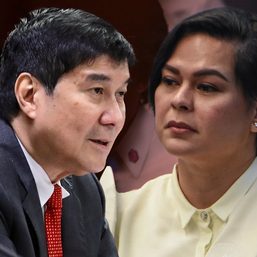
![[WATCH] In the Public Square with John Nery: The new pollsters](https://www.rappler.com/tachyon/2024/01/In-the-Public-Square-LS-SQ.jpeg?resize=257%2C257&crop=398px%2C0px%2C1080px%2C1080px)
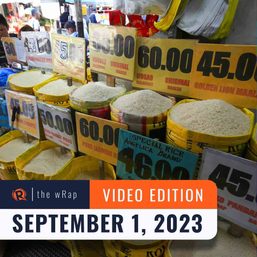
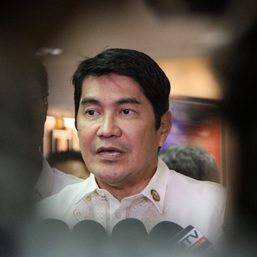
There are no comments yet. Add your comment to start the conversation.